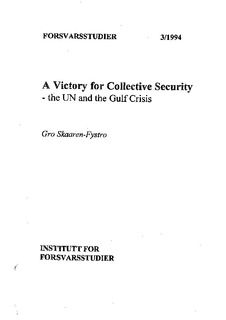| dc.contributor.author | Skaaren-Fystro, Gro | |
| dc.date.accessioned | 2011-03-29T10:22:00Z | |
| dc.date.available | 2011-03-29T10:22:00Z | |
| dc.date.issued | 1994 | |
| dc.identifier.uri | http://hdl.handle.net/11250/99291 | |
| dc.description | The study throws light on the role of the UN in the Gulf crisis. The Iraqi invasion of Kuwait on August 2 1990 was a clear-cut breach of international law, and there was no doubt that the UN Security Council had a formal reason for acting. However, formalities alone cannot explain the commitment made by the Security Council members in this particular crisis. The l2th resolution of the Iraq-Kuwait crisis authorized the use of all necessary means. Thus it represented the closest the organization has come in using the system of economic and military sanctions according to the Charter. The study concentrates on the questions why the members of the Security Council were able to find consensus in taking these measures, and how the UN system functioned during the crisis. | en_US |
| dc.language.iso | eng | en_US |
| dc.publisher | Institutt for forsvarsstudier | en_US |
| dc.relation.ispartofseries | Forsvarsstudier;3 | |
| dc.subject | Gulfkrigen 1991 | en_US |
| dc.subject | FN | en_US |
| dc.subject | FNs sikkerhetsråd | en_US |
| dc.title | A victory for collective security: the UN and the Gulf crisis | en_US |
| dc.type | Others | en_US |
| dc.source.pagenumber | 112 s. | en_US |
